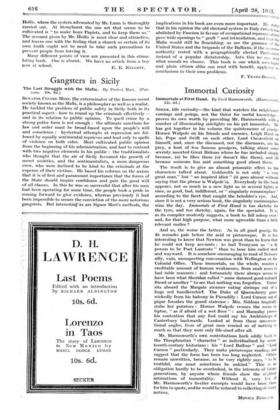Immortal Curiosity
SnEER, idle curiosity—the kind that watches the neighbours' comings and goings, not the thirst for useful knowledge_ provesits own worth by providing Mr. Harmsworth with a number of illuminating sidelights on his pet immortals. lie has got together in his volume the quintessence of gossip: Horace Walpole on his friends and enemies, Leigh Hunt on his, Pope and Swift on each other, Lord Chesterfield on himself, and, since the discussed, not the discussers, are his prey, a host of less famous gossipers, talking about some seventy assorted Great Britons whom he has included simply because, (a) he likes them (or doesn't like them), and (t) because someone has said something good about them.
The result is to give an almost prismatic effect to the characters talked about. Goldsmith is not only " a very great man," but " an inspired idiot " (it goes almost without saying that the phrase is Walpole's). Everybody in the book appears, not so much in a new light as in several lights at once, as good, bad, indifferent, or " singularly commonplace " according to the facet that caught the beholder's eye. And, since it is not a very serious book, the singularly commonplace wins the day. Immortals at First Hand is too sketchy for the tyro, and too sketchy, again, for the specialist. It is, as its compiler modestly suggests, a book to fall asleep over: and, for that high purpose, what more agreeable than a little relevant malice ?
And so, the worse the better. As in all good gossip, the fit remarks pale before the acid or picturesque. It is less interesting to know that Newton was great than to learn that he could not keep accounts : to hail Tennyson as " a fit person to be Poet Laureate " than to hear him called droll and wayward. It is somehow encouraging to read of Nelson's silly, vain, unsuspecting conversation with Wellington at the Colonial Office. These immortals, on the whole, muster a creditable amount of human weaknesses, from snub noses to bad table manners : and fortunately there always seems to have been what Sheridan called " some damned good-natured friend or another " to see that nothing was forgotten. Turner sits aboard the Margate steamer eating shrimps out of a huge red handkerchief. The Duke of Queensberry gazes wickedly from his balcony in Piccadilly : Lord Curzon out of pique forsakes the grand staircase : Mrs. Siddons tragically stabs her potatoes : Horace Walpole crosses the room on tiptoe, " as if afraid of a wet floor " : and Macaulay proves Iris contention that any fool could say his Archbishops of Canterbury backwards. Looked at from these unconven- tional angles, lives of great men remind us of nothing so much as that they were only life-sized after all.
Mr. Harmsworth's own contributions hark oddly back to the Theophrastan " character " as individualized by seven- teenth-century historians : his " Lord Balfour " and " Lard Curzon " particularly. They make picturesque reading, and suggest that the form has been too long neglected. Others remain unwritten, because, as he very rightly says, " to be truthful, one must sometimes be unkind." This is an obligation hardly to be overlooked, in the interests of future generations, by anyone whose friends show the slighted intimations of immortality. Without it, very few of Mr. Harmsworth's livelier excerpts would have been there for him to quote, and he would be reduced to collecting obituary notices.
MONICA REDLICH.






































 Previous page
Previous page